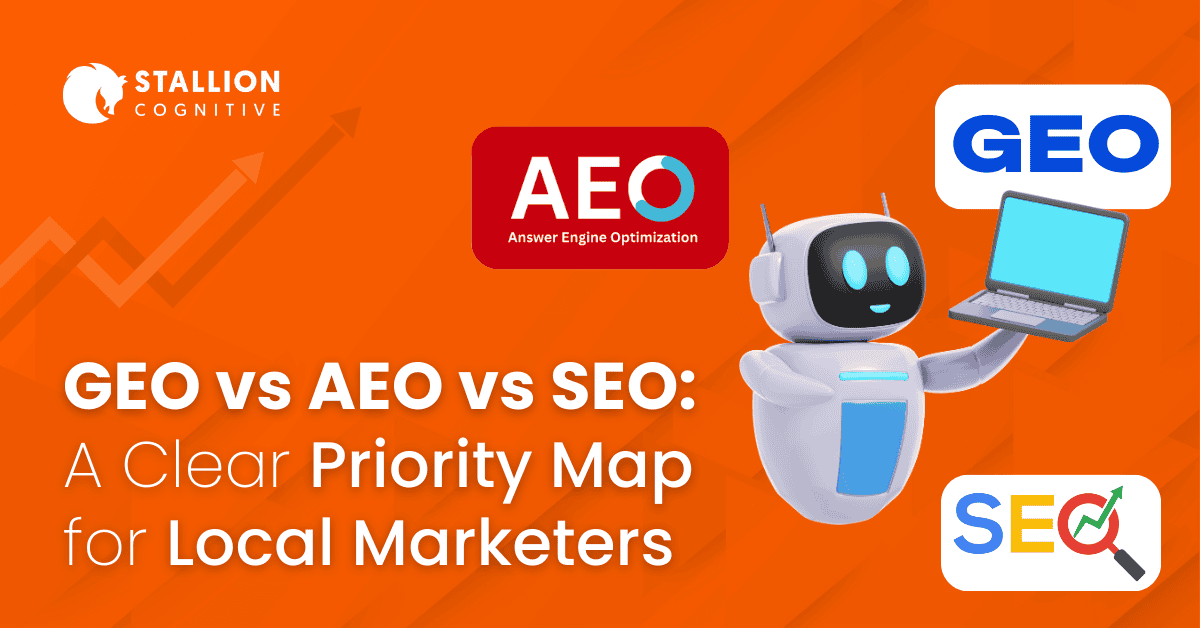The local marketing landscape changed dramatically, your customers now search differently than they did two years ago.
They ask:
- Siri for "best Italian restaurant near me with outdoor seating.”
- Use ChatGPT to find "local tax accountants specializing in small business.”
- Expect instant, accurate answers without clicking through multiple websites.
This shift demands three distinct optimization strategies.
Search Engine Optimization (SEO), Answer Engine Optimization (AEO), and Generative Engine Optimization (GEO) now work together to capture local customers across all search platforms.
But here's the challenge.
Most local businesses don't know where to start or which strategy deserves priority.
This guide provides a clear priority map for local marketers.
You'll discover which optimization strategy to implement first, how to measure success, and when to expand your efforts.
Understanding the Three Pillars of Modern Local Search
Here’s how SEO, AEO, and GEO combine to meet today’s “ask-and-get” expectations and where each one shines for driving local customers.
What is SEO (Search Engine Optimization)?
SEO remains the foundation of local visibility.
It's the practice of optimizing your website and online presence to rank higher in traditional search engine results like Google and Bing.
For local businesses, SEO includes:
- Local keyword optimization (targeting "dentist in downtown Portland")
- Google Business Profile optimization with accurate NAP information
- Local link building from community organizations and local directories
- On-page optimization with location-specific content
- Technical SEO ensuring fast loading speeds and mobile responsiveness
Why Local SEO Still Dominates:
Google processes 5 trillion searches daily, with location-based searches driving immediate business results. Local SEO generates the highest conversion rates because customers searching for local services have immediate purchase intent.
What is AEO (Answer Engine Optimization)?
AEO focuses on capturing zero-click searches and voice queries. It optimizes content to appear in featured snippets, voice assistant responses, and direct answer boxes.
Key AEO tactics for local businesses:
- FAQ schema markup answering common customer questions
- Structured data highlighting business hours, services, and contact information
- Question-focused content matching natural speech patterns
- Local knowledge graph optimization establishing entity relationships
Local AEO Example: When someone asks, "What are the hours for Smith's Hardware Store?" AEO ensures your business hours appear immediately in voice responses and featured snippets.
What is GEO (Generative Engine Optimization)?
GEO optimizes for AI-powered search platforms like Google's Search Generative Experience (SGE), ChatGPT, and Perplexity AI. These platforms synthesize information from multiple sources to create comprehensive answers.
GEO strategies include:
- Authoritative long-form content demonstrating expertise
- Natural language optimization matching conversational AI patterns
- Citation-worthy information with proper attribution and sources
- Entity-based content helping AI understand your business relationships
GEO in Action
When a user asks ChatGPT, "Find me a wealth management firm in Boston that specializes in retirement planning," GEO ensures your firm gets mentioned and recommended in the AI-generated response.
The Local Marketer's Priority Map: A Strategic Framework
Follow this phased roadmap to decide what to do first, what to measure, and when to scale from SEO to AEO and GEO.
Phase 1: Foundation Building (Months 1-6)
Priority: SEO First
Start with traditional SEO because it provides:
- Measurable ROI through organic traffic and rankings
- Established best practices with proven results
- Immediate visibility in Google Maps and local search results
- Foundation for all other strategies, providing content and authority
Implementation Checklist:
- Optimize Google Business Profile with complete information
- Create location-specific landing pages
- Build local citations in directories
- Implement basic technical SEO improvements
- Develop local content targeting neighborhood keywords
Phase 2: Voice and Snippet Capture (Months 4-9)
Priority: Add AEO
Layer AEO on your SEO foundation when:
- Your local SEO shows consistent rankings
- You receive regular customer questions
- Voice search queries increase in your analytics
- Competitors appear in featured snippets
AEO Integration Steps:
- Add FAQ schema to existing pages
- Create question-focused content
- Optimize for "near me" voice searches
- Structure content for snippet capture
- Monitor zero-click search performance
Phase 3: AI Platform Expansion (Months 10-18)
Priority: Implement GEO
Expand to GEO when:
- Your market shows AI search adoption
- Customers mention using ChatGPT or AI assistants
- Competitors gain visibility on AI platforms
- You have authoritative content to leverage
GEO Development Focus:
- Create comprehensive service guides
- Develop thought leadership content
- Optimize for entity recognition
- Build credibility signals
- Monitor AI platform mentions
Strategy Comparison: Which Delivers the Best Local Results?
| Strategy | Timeline | Investment | Local Impact | Measurement |
|---|---|---|---|---|
| SEO | 3-6 months | Medium | High traffic, leads | Rankings, organic traffic |
| AEO | 2-4 months | Low | Voice search capture | Featured snippets, voice queries |
| GEO | 6-12 months | High | AI platform visibility | Citations, brand mentions |
Combined Strategy Results:
Businesses implementing all three strategies see an average 47% increase in organic traffic compared to SEO-only approaches. However, the investment required varies significantly by business size and market.
Local Implementation Strategies by Business Type
Different industries win in different ways. Use these vertical-specific plays to focus effort where it pays off fastest.
Professional Services (Lawyers, Accountants, Consultants)
Recommended Priority: SEO → GEO → AEO
Professional services benefit from establishing authority through comprehensive content before optimizing for quick answers.
- SEO Focus: Target practice area keywords with location modifiers
- GEO Focus: Create detailed guides showcasing expertise
- AEO Focus: Answer common legal/financial questions
Service-Based Businesses (Restaurants, Salons, Contractors)
Recommended Priority: SEO → AEO → GEO
Service businesses need immediate visibility for "near me" searches and voice queries.
- SEO Focus: Local pack optimization and review management
- AEO Focus: Hours, pricing, and service questions
- GEO Focus: Service comparisons and recommendations
Retail and E-commerce
Recommended Priority: AEO → SEO → GEO
Retail businesses benefit from capturing product and inventory questions first.
- AEO Focus: Product availability and store information
- SEO Focus: Product and location-based searches
- GEO Focus: Product comparisons and shopping advice
Measuring Success: KPIs for Each Strategy
Track the right metrics per pillar so you can prove impact, spot gaps, and confidently reallocate budget.
SEO Metrics
- Local pack rankings for target keywords
- Organic traffic from location-based searches
- Google Business Profile views and actions
- Local citation consistency scores
AEO Metrics
- Featured snippet appearances for branded queries
- Voice search traffic from Google Analytics
- Zero-click search impressions in Search Console
- FAQ schema implementation coverage
GEO Metrics
- Brand mentions in AI-generated responses
- Citation appearances across AI platforms
- Entity recognition in knowledge graphs
- Thought leadership content engagement
Common Implementation Mistakes Local Marketers Make
Skip these pitfalls that slow results and dilute visibility across search, answers, and AI-driven platforms.
Starting with GEO Before SEO Foundation
Many businesses jump to AI optimization without solid local SEO fundamentals. This approach fails because AI platforms reference authoritative, well-optimized content.
Solution: Build SEO authority first, then expand to AI platforms.
Ignoring Voice Search Patterns
Local businesses often optimize for typed queries while ignoring voice search differences.
Solution: Research how customers verbally ask about your services and optimize accordingly.
Treating Strategies as Separate Initiatives
The biggest mistake is implementing SEO, AEO, and GEO as isolated strategies rather than integrated approaches.
Solution: Create content that serves all three optimization goals simultaneously.
The Future of Local Search: What's Coming in 2025
Stay ahead of shifts shaping discovery, from hyper-local AI answers to visual search and voice-driven purchases.
- Hyper-Local AI Responses: AI platforms will provide more neighborhood-specific recommendations.
- Visual Search Integration: Local businesses need image optimization for Google Lens and visual search platforms.
- Personalized Local Results: AI will deliver increasingly personalized local business recommendations based on user history and preferences.
- Voice Commerce Growth: Voice-activated local purchases will require new optimization approaches combining AEO and e-commerce strategies.
Final Thoughts
The future belongs to local businesses that adapt their search strategies.
While SEO remains your foundation, integrating AEO and GEO creates comprehensive visibility across all search platforms.
Start with your SEO foundation. Layer in AEO for voice search capture. Expand to GEO as your market adopts AI search tools.
This three-phase approach ensures you capture customers regardless of how they search for your services.
The businesses that implement this priority map now will dominate local search results throughout 2025 and beyond.
Ready to implement these strategies for your local business?
Contact our team at Stallion Cognitive for a customized local search optimization strategy that combines SEO, AEO, and GEO for maximum visibility and lead generation.
Frequently Asked Questions
1. Should small local businesses focus on GEO or stick with traditional SEO?
Start with SEO for foundation building, then add AEO for voice search capture. GEO becomes important when your local market adopts AI search platforms regularly.
2. How long does it take to see results from each optimization strategy?
SEO shows results in 3-6 months, AEO in 2-4 months, and GEO in 6-12 months. Combined strategies accelerate overall visibility improvements.
3. Can I implement all three strategies simultaneously with a small budget?
Focus on SEO first with basic AEO integration. GEO requires more content investment, so add it after establishing local search authority.
4. Which strategy works best for "near me" searches?
SEO remains most effective for "near me" searches, but AEO captures voice-based "near me" queries. Both strategies complement each other perfectly.
5. How do I know if my local market uses AI search enough to justify GEO investment?
Monitor customer inquiries and survey methods. If customers mention using ChatGPT or AI assistants for business research, GEO becomes worthwhile.

